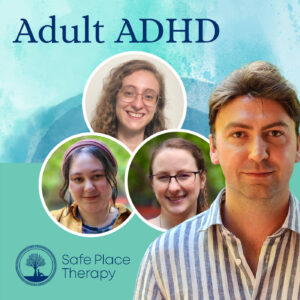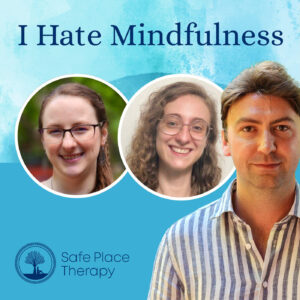ADHD Counselling
Our collective understanding of ADHD has grown a lot over recent years.
Safe Place Therapy offers ADHD Counselling.
ADHD stands for Attention Deficit Hyperactivity Disorder. It’s a set of traits that can impact a person’s functioning but it also has some positives.
More and more people are recognising themselves as having ADHD, and seeking support to understand this. In this article we will talk about some common experiences and what can help.
ADHD is commonly misunderstood, even by mental health professionals sometimes. Our clients with ADHD often tell us they have been misdiagnosed with other conditions like anxiety, depression, or borderline personality disorder. Our clinicians are skilled in identifying what might be caused by ADHD, and what might be something else. They can help you learn more about it, guide you in seeking a diagnosis, and support you with real, practical strategies to help you manage your experiences.
What is ADHD?
ADHD stands for Attention Deficit Hyperactivity Disorder. It is set of traits that can impact a person’s functioning, but also provide some positives.
There are two general sets of traits for ADHD – categorised as hyperactivity and inattentiveness. These are not totally separate, and people can experience traits from both categories.
People with hyperactive ADHD traits are the most commonly known ones. They may talk a lot and fast. Or struggle to stay still, fidget and interrupt conversations. People with inattentive ADHD tend to struggle to focus or listen, experience forgetfulness, and might be described by others as vague or spacey.
You may have come across the term ADD before. This is an old term used to describe inattentive type ADHD. Now, the clinical term for the diagnosis is ADHD, regardless of whether or not they experience hyperactivity.
We still don’t know the full story of what causes ADHD. However, we do know that you are born with it and genetics play a big part. And we know that ADHD counselling can help.
What are some common experiences
for people with ADHD?
People’s experiences can vary widely, and two people might have very different experiences of the same condition. Since ADHD is a set of traits that have naturally evolved in our species, it is possible to develop good coping strategies that help you manage easier in your day to day life.
There are many ways to experience ADHD traits and this article is not exhaustive. However, some common experiences are struggling to focus and stay on track with tasks, maintain daily routines, regulating emotions, and maintaining relationships.
Some other common experiences are losing time – suddenly realising it’s 4 pm and you are not sure what you did all day. Another example is tangential or lateral thinking – thought processes that are less linear, and more creative. This can look like going on tangents while speaking. Or having many threads of thought going all at once, and sometimes not being sure how you got there. This can be challenging in some contexts like work. But great in other areas like creative pursuits.
Experiencing deep, intense emotions that are hard to describe or control is another common theme we hear from our ADHD clients. However, not all people with ADHD experience this and it is not part of the diagnostic criteria for ADHD. People with ADHD experience all the same emotions as people who don’t, but may experience them with more intensity.
Differences in communication patterns might happen for people with ADHD too. They might be more likely to tell a story with lots of detail, due to a tendency to go on tangents or get hyperfixated on a topic of interest. This is sometimes misunderstood by others as the person trying to ‘take over’ the conversation, and can lead the person to feel out of step in certain social situations.
Another common experience, which is also not part of the diagnostic criteria, is rejection sensitivity dysphoria – which means being more sensitive to perceived criticism or rejection.
Since these experiences can be hard to understand or get support for, it is easy for people to develop shame about them. It is easy to think that there is something wrong with you. This is not true. As we said before, ADHD is simply a set of traits that can be managed. And the fact that managing them is not always easy is not anyone’s fault. We commonly work with clients to undo these beliefs they have gained along the way, and recognise that the problem is not within themselves.
Find Strategies to Make Life Happier
We believe in the social model of disability. This is the idea that people are ‘disabled’ by their health conditions because we live in a society that does not cater for them. Part of what makes having ADHD a challenge is that we do not have a good social understanding or acceptance of these conditions.
Imagine if we lived in a world where it was okay to focus on many tasks at once. Or where it was socially acceptable to say “Sorry, I zoned out for a second but I’m back now” during a conversation. Or even if it was socially acceptable to fidget. Life would be a lot easier for people with ADHD and they may not feel as impacted by their traits.
Sadly, that is not the world we live in. People with ADHD have to learn how to make it work in this world. Still, it is important to acknowledge that this is where a large part of where the problem lies – not in you. Activists are working tirelessly to create a better world for neurodivergent people. And while we can hope for that in the future, ADHD counselling can help you find strategies to make life happier and more liveable in the now.
How to get
assessed for ADHD
A psychiatrist or a psychologist can do a formal assessment and diagnosis for ADHD. You will need a GP referral to see either of these professionals. If you are interested in trying medication, it is best to see a psychiatrist, as only psychiatrists can prescribe medications.
Seeing an ADHD counsellor or psychologist can help you find coping strategies, which we will discuss below.
If you’re curious to know if you might have ADHD, try this online self-assessment tool.
ADHD in adults
A lot of people are being diagnosed with ADHD in adulthood. This is because the mental health field understands ADHD much better now than we did in the past, when these adults were children.
In adult ADHD, some signs can be struggling to keep up with the demands of modern life – work pressures, remembering to pay bills on time, keeping on top of appointments, making sure the laundry is done, and so on. Some other examples include struggling to sit in long meetings, blurting things out in conversations, impulsivity, or feeling like you’ve talked too much.
Being diagnosed as an adult can be a liberating experience for some – they feel like they have finally found some answers. It can also be difficult – it sometimes doesn’t feel good to have a diagnosis of a “disorder.” It can also be complicated – some people feel that because they have managed this far, maybe they don’t really deserve the diagnosis.
ADHD in children
ADHD in children is the same as ADHD in adults, but will show up in the context of school and friendships more. Kids with ADHD might struggle with getting homework done on time and always do it at the last minute; they might struggle to stay still and quiet in class; they might appear like they are not listening. They might struggle to keep up with the rigor of school, despite being intelligent and engaged.
The symptoms may be misinterpreted, just as with adults. A child with ADHD may be seen as simply acting out, behaving badly, or not applying themself. It is important to know that this is not the case. Their behaviour is a reflection of their particular brain wiring, and instead of pushing against the behaviour, it’s important to understand it and work with it.
ADHD in women, girls, and people assigned
female at birth
It has been found that gender has a significant impact on whether or not ADHD is picked up, in adults and children. It is more likely that the signs won’t be picked up on. And more likely that they will be misinterpreted as something else.
Moreover, inattentiveness is more common than hyperactivity in this group (though that is not a rule). Inattentiveness can be harder to pick up on because it is not as obvious as hyperactivity. For example, a child losing focus in a classroom is not as noticeable compared to a child who is making noise and interrupting other students.
Additionally, research has shown that women, girls, and people assigned female at birth are less likely to be taken seriously about their concerns by healthcare professionals – making it harder for them to get a diagnosis even if they do reach out.
How ADHD counselling can help?
There are many tools and coping strategies available to people with ADHD. And speaking to a professional about your habits can help you find the right strategies for you.
Everybody needs something different. It is worth thinking about what is already working for you, what doesn’t work for you, and what makes you tick. Some common tools are using reminders, timers, schedules, calendars, lists, post it notes, apps designed to help with productivity – the list is endless. These all can help manage the symptoms of ADHD.
Getting creative with this can help, too. For example, making your calendar colourful and visually pleasing might make it more likely that you will use it.
For some people, medication is a good option, as well as ADHD counselling, which we will discuss below.
What does ADHD medication do?
ADHD is a manageable and treatable condition, with plenty of support options available. Finding what works for you might take some time, and reaching out to a professional or tapping into online ADHD communities can be great places to start.
Booking online is easy.
Just click the button below:
FEES: Individual Telehealth Counselling (Zoom or Phone)
please refer to individual clinician fees on the About Us page.
Get the ADHD Counselling support you need.
Reach out today!
Our Therapists

- Footscray, Online

- Footscray, Online

- Footscray, Online

- Footscray, Online

- Footscray, Online



